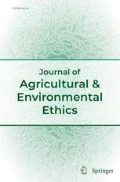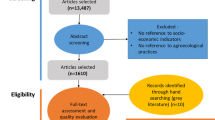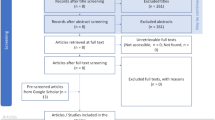Abstract
FAO has a unique and essential rolein addressing the ethical problems facinghumanity and in making these problems intoopportunities for practical resolution. A broadrange of ethical issues in agriculture,fisheries, and forestry were identified byanalysis of the literature and by interviewswith FAO staff. Issues include sharing accessto and preserving natural resources,introduction of new technology, conservatismover the use of genetic engineering, ethics inanimal agriculture, access to information, foodsecurity, sustainable rural development,ensuring participation of all people indecision making and in receiving benefits ofagriculture, reducing corruption, andinvolvement of private and public sectors indecision making. Rather than viewing theseissues as problems, they should be viewed asopportunities for debate, learning aboutothers' views, and resolution. The UnitedNations has an important role to play in howdecisions are made in the global ethical debatein food and agriculture. The ethical role ofFAO is to promote global food security,balanced conservation, management andutilization of natural resources, andsustainable rural development. FAO should fullyand publicly assume its ethicalresponsibilities, gathering and sharinginformation on ethics in its areas of mandate,acting as an interactive forum, and providingexpert guidance on policy options and choicesbased on practical ethical analysis.
Similar content being viewed by others
REFERENCES
Arnold, J. E. M., Managing Forests as Common Property. FAO Forestry Paper 136 (FAO, Rome, 1998).
Bhardwaj, M., F. Maekawa, Y. Niimura, and D. R. J. Macer, “Ethics in Food and Agriculture: Views from FAO,” International Journal of Food Science and Technology 38(5) (2003), 565–588.
Boyens, I., Unnatural Harvest; How Genetic Engineering is Altering Our Food (Doubleday, Canada, 1999).
Broom, D. M., “Measuring the Effects of Management Methods, Systems, High Production Efficiency and Biotechnology on Farm Animal Welfare,” in T. B. Mepham, G. A. Tucker, and J. Wiseman (eds.), Issues in Agricultural Bioethics (Nottingham University Press, Nottingham, 1995), pp. 319–334.
Bruce, D. and A. Bruce (eds.), Engineering Genesis. The Ethics of Genetic Engineering. Society, Religion and Technology Project (Earthscan, London, 1998).
CAC, Codex Alimentarius ad hoc Task Force on Novel Foods Produced from Biotechnology, reports on-line, http://www.codexalimentarius.net/Reports.htm (2002).
CFS (Committee on Food Security), 99/4 Reporting Format for Monitoring the Implementation of the World Food Summit Plan of Action, Paper Prepared for 25th Session of CFS, 31 May- 3 June, 1999 (FAO, Rome, 1999).
Comstock, G. L., Vexing Nature? On the Ethical Case Against Agricultural Biotechnology (Kluwer Academic, Boston, 2000).
deWaal, F., Good Natured. The Origins of Right and Wrong in Humans and Other Animals (Harvard University Press, Cambridge, MA, 1996).
Dykstra, D. P. and R. Heinrich, FAO Model Code of Forest Harvesting Practice (FAO, Rome, 1996).
EFB (European Federation of Biotechnology), Task Group on Public Perceptions of Biotechnology, Ethical Aspects of Agricultural Biotechnology. Bioethical Aspects of Biotechnology in the Agrofood Sector (BABAS) (Cambridge Biomedical Consultants, Amsterdam, 1999).
Eubios Declaration for International Bioethics, Eubios Journal of Asian and International Bioethics 12 (2002), 46–48.
FAO, The Sixth World Food Survey (FAO, Rome, 1996).
FAO, FAO Policy and Strategy on Cooperation with Non-Governmental and Civil Society Organisations (FAO, Rome, 1999a).
FAO, Principles and Guidelines for FAO Cooperation with the Private Sector (FAO, Rome, 1999b).
FAO, See Ethics in Food and Agriculture Homepage, http://www.fao.org/ethics/index_en. htm (2000).
FAO, Ethics series 1. Ethical Issues in Food and Agriculture (FAO, Rome, 2001a).
FAO, Ethics series 2. Genetically Modified Organisms, Consumers, Food Safety and the Environment (FAO, Rome, 2001b).
Hardaker, J. B., R. B. N. Huirne, and J. R. Anderson, Coping with Risk in Agriculture (CAB International, Oxford, 1997).
Ho, M.-W., Genetic Engineering: Dream or Nightmare? (Gateway Books, London, 1998).
IPGRI, Ethics and Equity in Conservation and Use of Genetic Resources for Sustainable Food Security. Proceeding of a Workshop to Develop Guidelines for the CGIAR, Brazil, 21–25 April 1997 (IPGRI, Rome, 1997).
Kaul, I., I. Grunberg, and M. A. Stern (eds.), Global Public Goods: International Cooperation in the 21st Century (Oxford University Press, Oxford, 1999).
Lappé, M. and B. Bailey,Against the Grain: The Genetic Transformation of Global Agriculture (Earthscan, Washington, 1999).
Lesser, W., Sustainable Use of Genetic Resources Under The Convention On Biological Diversity: Exploring Access and Benefit Sharing Issues (CAB International, Oxford, 1998).
Macer, D. R. J., Shaping Genes: Ethics, Law and Science of Using Genetic Technology in Medicine and Agriculture (Eubios Ethics Institute, Christchurch, 1990).
Macer, D. R. J., Bioethics for the People by the People (Eubios Ethics Institute, Christchurch, 1994).
Macer, D. R. J., “Food, Plant Biotechnology and Ethics,” Proceedings of the UNESCO International Bioethics Committee Fourth Session, Volume I (UNESCO, Paris, 1997), pp. 29–53.
Macer, D. R. J., Bioethics is Love of Life: An Alternative Textbook (Eubios Ethics Institute, Christchurch, 1998).
Macer, D. R. J., Report of the Visiting Scientist on Ethics in Food and Agriculture (FAO, Rome, 1999).
Macer, D. R. J. (Editor in Chief), UNESCO/IUBS Bioethics Dictionary (Eubios Ethics Institute, Christchurch, 2002).
Macer, Darryl R. J., Ethical, Legal and Social Issues of Genetically Modified Disease Vectors in Public Health (UNDP/World Bank/WHO Special Program for Research and Training in Tropical Diseases (TDR), Geneva, 2003).
Mepham, T. B., G. A. Tucker, and J. Wiseman (eds.), Issues in Agricultural Bioethics (Nottingham University Press, Nottingham, 1995).
Ostrom, E., Governing the Commons. The Evolution of Institutions for Collective Action (Cambridge University Press, Cambridge, 1990).
Pitcher, T. J., Rapfish, A Rapid Appraisal Technique for Fisheries, and Its Application to the Code of Conduct for Responsible Fisheries. FAO Fisheries Circular (FAO, Rome, 1999).
Plucknett, D. L., J. I. Cohen, and M. E. Horne, “Role of the International Agricultural Research Centres,” in G. J. Persley (ed.), Agricultural Biotechnology: Opportunities for International Development (CAB International, Oxford, 1990), pp. 400–414.
Potter, V. R., Bioethics: A Bridge to the Future (Prentice-Hall, Englewood Cliffs, 1971).
Sasson, A., Feeding Tomorrow's World, Sextant-3 (UNESCO, Paris, 1990).
Thompson, P. B., Agricultural Ethics: Research, Teaching and Public Policy (Iowa State University Press, Des Moines, 1998).
UNESCO, Universal Declaration on the Human Genome and Human Rights, Adopted Unanimously by the General Assembly of UNESCO (UNESCO, Paris, 1997).
Van Dommelen, A., Hazard Identification of Agricultural Biotechnology. Finding Relevant Questions (International Books, Utrecht, 1999).
Author information
Authors and Affiliations
Rights and permissions
About this article
Cite this article
Macer, D.R., Bhardwaj, M., Maekawa, F. et al. Ethical Opportunities in Global Agriculture, Fisheries, and Forestry: The Role for FAO. Journal of Agricultural and Environmental Ethics 16, 479–504 (2003). https://doi.org/10.1023/A:1026367223731
Issue Date:
DOI: https://doi.org/10.1023/A:1026367223731




